gun control

On June 10, Emilio Hoffman, a 14-year-old student at Reynolds High School in Troutdale, Ore., was transformed, from a good-hearted kid with his life ahead of him to a statistic.
He was an athlete, a soccer coach, a people pleaser, a brother, a son. He had a girlfriend, and he loved to make people laugh.
Now, he’s a red dot on a graph, one blip in an “American victims of gun violence” total that is already absurdly high, and will no doubt be higher the next time you check it.
Emilio’s crime? He went to school, on a day that another student decided — for reasons none of us can fathom — to bring an AR-15 rifle from home and start shooting people.
What happened to Emilio is not a tragedy. A tragedy is when something happens that no one could have helped: an accident, a natural disaster, a crime that could not have been foreseen or prevented.
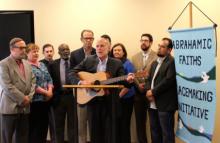
An interfaith group representing 15 organizations spoke out against gun violence Thursday in the wake of last week’s deadly shooting spree in Santa Barbara.
Religious organizations have lobbied for stricter gun control in the wake of mass shootings, and this latest effort was no exception.
“We are here this morning to stand with the multitude of groups across the United States who are advocating for sensible, common sense laws to limit the effects of gun violence,” said Steve Wiebe, co-chair of the Abrahamic Faiths Peacemaking Initiative. “Our faith traditions — Judaism, Christianity, and Islam — spur us to peaceful solutions as we recognize the inherent worth of each individual life.”
Elliot Rodger killed six and injured 13 others in Santa Barbara on Friday before dying by an apparently self-inflicted gun wound. The Santa Barbara County Sheriff’s Office reported that deputies found three semi-automatic handguns in his car. All three were bought legally.

During the Crusades, conversion by the sword was a common practice. Today, it’s conversion by the bullet.
A growing trend in evangelism among some more conservative churches is to promise people a gun in exchange for attendance.
Some more prominent examples from the past few weeks: In Kentucky, several churches are hosting “Second Amendment Celebrations,” which feature a steak-and-potatoes dinner followed by a conversion sermon preached by a former pastor, outdoor TV host, and gun enthusiast. Attendees are promised the chance to win a firearm in exchange for showing up and staying to the end of the event. In New York, one church is planning to end its Sunday worship service with a raffle for a free AR-15 to honor “hunters and gun owners who have been so viciously attacked by the anti-Christian socialist media and antichristian socialist politicians the last few years.”
The organizers of these events claim they’re an effective way to bring people to Christ. By uniting gun culture with Christianity, they’re reaching out to an unchurched population to lead them to salvation.

A year ago this week, news headlines were filled with the story of Hadiya Pendleton. She was a 15-year-old band majorette from Chicago, who would march in the 2013 Presidential Inaugural Parade with her school. Just days after marching in the nation’s capital, Hadiya returned to Chicago’s south side where she was murdered by gunfire in Marsh Park after seeking shelter from a rainstorm. First Lady Michelle Obama attended the funeral, and Hadiya’s parents turned advocates and supporters of commonsense gun laws. The murder of Hadiya Pendleton became a painful representation of the nation’s broken gun laws and the effect that gun violence has had on the millennial generation.
Generation Progress and The Center for American Progress recently released a report: “Young Guns: How Gun Violence is Devastating the Millennial Generation.” According to the report, “American children and teenagers are 4 times more likely to die by gunfire than their counterparts in Canada, 7 times more likely than young people in Israel, and 65 times more likely to be killed with a gun than children and teenagers in the United Kingdom.” These statistics are startling and call for renewed attention to what this study has called a public health crisis.
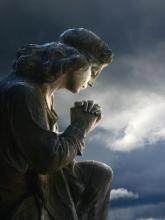
Any right-thinking stranger on our shores must read our daily news and think our nation has gone mad. We have cultivated the ability to end lives quickly; and yet we are continually surprised when our fellow citizens use the tools we have devised for exactly the purpose for which we invented them. Come to think of it, I think we’ve gone mad, too.
But our madness is not one that can be cured by laws alone. Laws can help to restrain us, and can help by making it a little less easy for us to find ourselves armed for murder. But we need something more, something that churches are better equipped to offer than legislatures are.
What we need right now is a richer moral imagination. We need better stories to tell ourselves, stories about the kind of people we could be. We need, more than anything, to learn to help one another to do the hard work of choosing not to pull the trigger.

The reality is bleak: 33 Americans are killed and 260 wounded from gun violence daily. Yesterday, as the culmination of its No More Names bus tour, which reached 25 states in 100 days, Mayors Against Illegal Guns rallied at the Capitol to urge Congress to pass a bill enforcing mandatory background checks for potential gun owners.
Spearheaded in 2006 by Boston Mayor Thomas Menino and New York Mayor Michael Bloomberg, MAIG began with 15 mayors, and has since grown to more than 1,000. The group’s goal is to make American communities safer by reducing the number of illegally obtained guns and by holding dealers accountable for potential gun-purchasers.
At the Hill gathering, representatives from myriad groups came together to advocate for stricter background checks and to push Congress out of their inaction. Tuesday, the Senate postponed a hearing on the legality of “Stand Your Ground” laws — on the heels of Monday’s Navy Yard gun violence.
Congressional representatives, mayors, police officers, military veterans, NRA members, women’s organizations, advocacy groups such as Mothers Demanding Action, faith community leaders (rabbis, priests, and pastors), university groups, children, gun violence survivors, and family members of those who have lost someone to gun violence were all in attendance at the No More Names rally. A broad coalition: racially, socioeconomically, and generationally diverse, as indiscriminant as the bullets that affect us all.
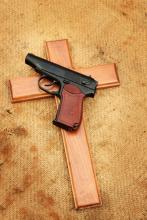
For the first time, the federal government has issued written guidelines for houses of worship that are confronted with a homicidal gunman.
Vice President Joe Biden released the new rules on Tuesday, six months after the school shooting in Newtown, Conn., that left 26 dead, including 20 children.
Beyond seeking shelter and waiting for police to arrive, as many Newtown victims did, the new rules also advise adults in congregations to fight back — as a last resort — in a bid to stop the shooter. The new federal doctrine is “run, hide or fight.”
In a push to revive the push to extend background checks, Mayors Against Illegal Guns organized the 100-day bus tour, called "No More Names: The National Drive to Reduce Gun Violence. Members of the tour will meet with families across the country to discuss gun control proposals. Advocates hope to have new gun-control legislation before Congress goes on recess in August. USA Today reports:
"When senators vote down a bill with such overwhelming support among the public, there is going to be that sense of outrage, and we've seen that persist since April 17," said John Feinblatt, chief policy adviser to New York City Mayor Michael Bloomberg.
Read more here.
Mayors Against Illegal Guns is buidling grassroots organizations across the country. After setbacks in Congress, the coalition is shifting its focus to local politicians and state legislatures. The coalition faces an uphill battle in many states against well-organized networks of gun enthusiasts, but New York City Mayor Michael Bloomberg has vowed to continue the fight. The New York Times reports:
“We don’t give up,” said John Feinblatt, who oversees Mayors Against Illegal Guns and serves as Mr. Bloomberg’s chief policy adviser. “We’re here for the long haul.”
Read more here.
A new study from the Violence Policy Center found you are more likely to die from gun violence than be killed in a traffic accident in 12 states and the District of Columbia. Motor vehicle fatality are on the decline because of safety measures instituted by the government. Firearms remain as the only consumer product not regulated by a federal agency. The Huffington Post reports:
Overall, there were 31,672 firearm deaths in 2010 and 35,498 motor vehicle deaths. Compare these numbers to 1999, when there were 28,874 firearm deaths and 42,624 motor vehicle deaths.
Read more here.
Gun control advocates are escalating their campaign toward senators who voted against the proposal to extend background checks. The campaign includes letter-writing campaigns, protests at town hall meetings and television ads. Several senators inclucding Sen. Kelly Ayotte (R-N.H.) and Sen. Jeff Flake (R-Ariz.) have seen their poll numbers plunge since voting against the proposal to extend backgroun checks. The Los Angeles Times reports:
"The outside game is about convincing those who voted no that they've made the wrong choice. And that is happening. There are definitely second thoughts out there," said Jim Kessler, a gun policy expert at the centrist Democratic think tank Third Way. Senators who opposed the agreement, he said, "expected the politics to work for them after the vote and so far it hasn't."
Read more here.

Julia Ward Howe, best known for writing "The Battle Hymn of the Republic" in 1862, began working to heal the wounds of the Civil War once the war ended. By 1870 Howe had become convinced that working for peace was just as important as her efforts working for equality as an abolitionist and suffragette. In that year she penned her "Mother's Day Proclamation," exhorting women to:
“Say firmly: ‘We will not have great questions decided by
irrelevant agencies.
Our husbands shall not come to us, reeking
with carnage, for caresses and applause.
Our sons shall not be
taken from us to unlearn all that we have been able to teach
them of charity, mercy and patience.
We women of one country will be too tender of those of another
country to allow our sons to be trained to injure theirs.
From the bosom of the devastated earth a voice goes up with our own.
It says "Disarm, Disarm! The sword of murder is not the balance
of justice.’"
Two studies of government data show US Gun crime has decreased from its peak in the middle of 1990s. However more than 50% of American think gun crime has risen. The media coverage of recent mass shooting may contribute to the misconception. The Los Angeles Times reports:
The number of gun killings dropped 39% between 1993 and 2011, the Bureau of Justice Statistics reported in a separate report released Tuesday. Gun crimes that weren’t fatal fell by 69%.
Read more here.
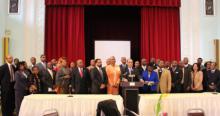
WASHINGTON — Black clergy have launched a new coalition to fight gun violence, saying they are undeterred by the recent failure of legislation on Capitol Hill and all too aware of the problem of gun violence.
At meetings held Tuesday in Washington and Los Angeles, supporters of the African-American Church Gun Control Coalition called gun violence “both a sin and a public health crisis” and committed to a three-year action plan of advocacy, education and legislative responses.
“As people of God and as faithful members we have the obligation to stir the world’s conscience and to call on our nation’s decision makers to do what is just and right,” said the Rev. Carroll Baltimore, president of the Progressive National Baptist Convention, which convened the coalition.

When a distressed child hugs a teddy bear, there is a moment of innocent comfort that not only soothes the child but the grownups around her, too.
No wonder, then, in the wake of the Dec. 14, 2012, mass shooting in Newtown, Conn., the donation of choice for many people was a teddy bear. The bears — huge, tiny, handmade, store-bought, rainbow-colored, traditional brown — began arriving within 24 hours of the tragedy. They came from churches, children's groups, Facebook campaigns, car dealerships, and individuals across the globe.
Undeniably, for some of the children in Newtown — and adults, for that matter — a new stuffed animal was just the right gift at the right time.

When the really hard stuff happens, when we witness the true face of evil, Americans have a predictable habit. Even as cameras feed the latest bubble-shattering violence into our family rooms, we start looking for someone or something — anything — other than the actual perpetrators to stone. We panic for a scapegoat.
We hunt tirelessly for the person (a parent, an educator, a cop) who didn't catch the warning signs, who failed to read a memo — anyone on whose shoulders we can cast our collective fear — then rush as many measures into place as possible, no matter the cost in treasure or freedoms, to regain an illusion of safety and impenetrability.
One iteration of that really hard stuff happened at Sandy Hook. The backstory is eerily familiar. A young man, left to stew in our culture's juices, fleshes out the nightmare in his broken soul, and deals out tragedy in living color as if the holy innocents of Newtown were mere pixels on a screen, points in a twisted "shooter." Now, just four months later, it's a swept-away moment of terror and sadness that everyone just wants to forget because it's unthinkable to think on it any longer.
Virginia Tech, Aurora, and Newtown each stopped the nation in its tracks but we eventually moved on, and before anyone might guess, well over 3,000 more have died by gun violence in America since December.
The U.S. Senate has just failed to get 60 votes on a bipartisan proposal to expand gun sale background checks. Politico reports:
“The vote was 54-46, with only four Republicans crossing the aisle and voting with the Democrats in favor of the bipartisan proposal by Sens. Joe Manchin (D-W.Va.) and Pat Toomey (R-Pa.). Sixty votes were needed.”
Four months after the Newtown massacre, a compromise measure that would have banned no guns, no magazines, is apparently still too strong. And what is especially outrageous is the continued abuse of the filibuster, requiring 60 votes for anything to pass the Senate. Is there any other legislative body in the world where a proposal can pass by 8 votes and lose?
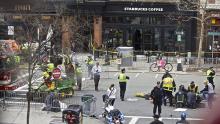
Resurrection is the theme of the 50 days of Eastertide. Yet, for decades, the month of April has been filled with particularly horrific deaths:
- The assassination of Martin Luther King, Jr. (April 4, 1968)
- The murder of 13 persons at the American Civic Association Immigration Center in Binghamton, N.Y. (April 3, 2009)
- The shooting death of 32 students at Virginia Tech. (April 16, 2007)
- The end of the Waco siege and the death of 82 members of the Branch Davidians. (April 19, 1993)
- The bombing of the Alfred P. Murrah Federal Building in Oklahoma City that killed one hundred sixty-eight children and adults. (April 19, 1995)
- The Columbine High School shooting resulting in deaths of 15 persons (April 20, 1999), a shooting that has been echoed in 31 schools since, most recently in Sandy Hook Elementary School of Newtown, Conn.
In 2013, April continues its trend. On Monday, April 15, someone decided to plant bombs along the route of the Boston Marathon. The explosions killed at least three people and wounded more than 100. Among the dead is 8-year-old Martin Richard.
Guns are dangerous idols. While mass shootings are happening at an alarming rate and an epidemic of gun violence plagues our nation’s cities, our society’s fanatical devotion to weapons prevents us from enacting solutions to curb the violence. The cost of worshipping these false idols continues to rise, as firearms kill more than 80 people a day.
Since the Dec. 14 shooting in Newton, Conn., nearly 3,500 people have died because of a gun. Some of them were suicides. Some were gang-related gun deaths. Many use these facts to insinuate that the deaths somehow aren't equally tragic. But as Christians we know that all of them were children of God created in the Divine image.
While the idolatry rages on, prophets are beginning to speak out.

The common good is not only about politics. The common good is about life and how we live it. It is ultimately about how we are all connected. It is about how our love or lack of love affects our families, our neighbors, our communities, our cities, our nation, and our world.
The common good is about personal brokenness. Have we taken the time to let Jesus come in and heal the wounds that distort the image of God within of us — wounds that drive daughters and sons, mothers and fathers to self-destruction? Have we taken the time to let the Great Physician heal the personal wounds that break families and friendships, slicing the central fabric of society? We are all connected.